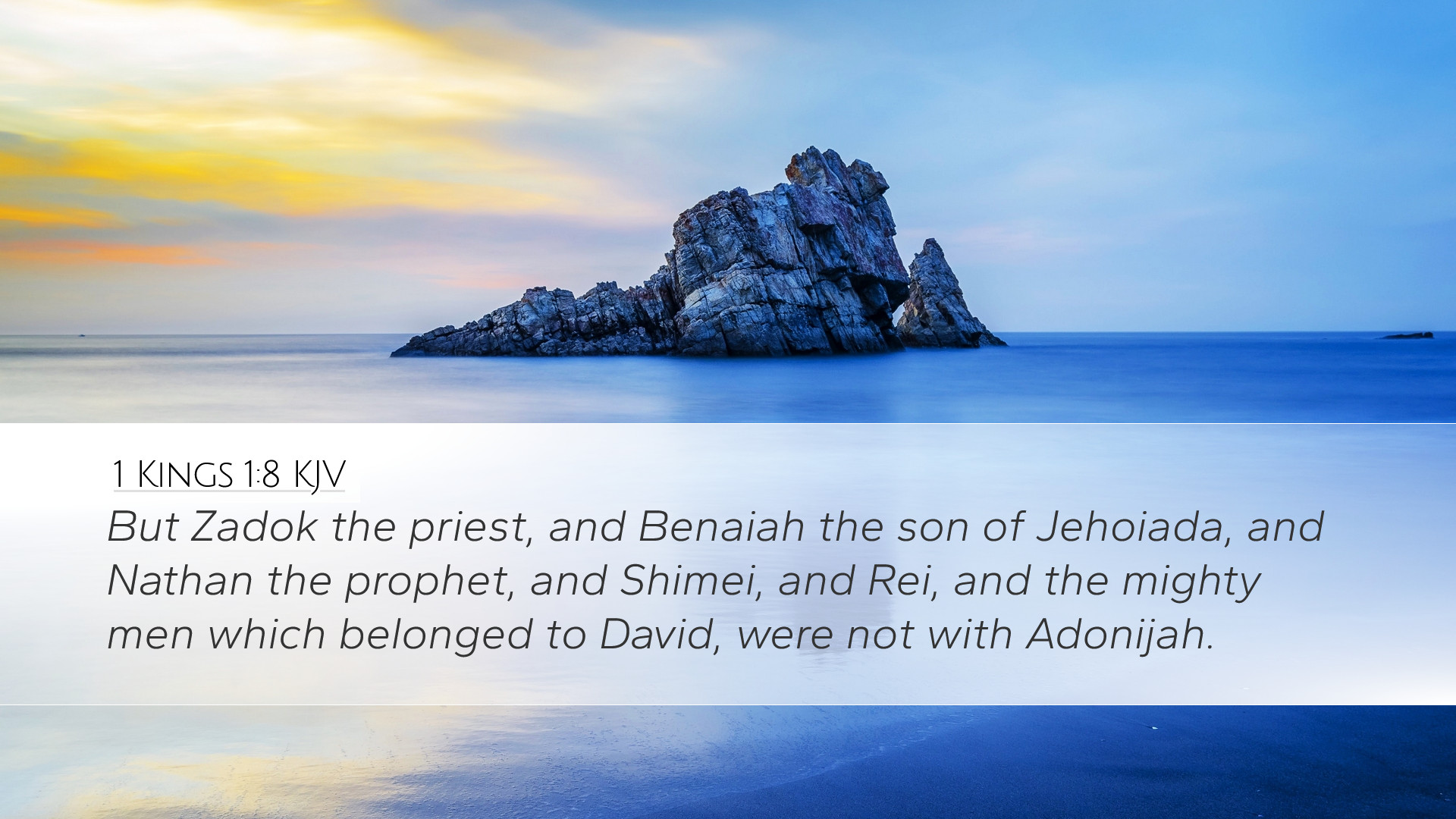Commentary on 1 Kings 1:8
Verse: "But Zadok the priest, and Benaiah the son of Jehoiada, and Nathan the prophet, and Shimei, and Rei, and the mighty men which belonged to David, were not with Adonijah."
Introduction
This verse presents us with a critical moment in the history of Israel's monarchy. It reveals the political maneuverings surrounding the succession of King David and highlights the significance of loyalty and divine election in leadership. In this commentary, we will analyze the implications of the individuals mentioned, the historical context, and spiritual insights drawn from the text.
Contextual Background
The events in 1 Kings chapter 1 occur late in King David's reign and set the stage for the transition of power to his son Solomon. Adonijah, one of David’s sons, attempts to establish his claim to the throne. This verse explicitly mentions key figures who opposed Adonijah’s ascension, emphasizing the importance of their roles.
Key Figures
- Zadok the Priest: Zadok represents the priestly line committed to God's covenant. He symbolizes fidelity to Yahweh's plan and a refusal to engage in schemes that undermine David's chosen successor.
- Benaiah the son of Jehoiada: A chief of David’s bodyguard, Benaiah's inclusion highlights his loyalty and courage. His military background signifies the potential conflict and the need for steadfast leaders in times of political unrest.
- Nathan the Prophet: Nathan's role is pivotal; he was the first to confront David regarding his sin with Bathsheba and to declare Solomon's future as king. His support against Adonijah reinforces the prophetic authority in guiding Israel's political matters.
- Shimei and Rei: These individuals, while less prominent, represent the diverse support that remained loyal to David’s lineage. Their inclusion indicates that Adonijah’s claim was not universally accepted.
- The Mighty Men of David: The presence of these warriors symbolizes the loyalty and dedication of David's closest companions, reinforcing that leadership should be founded on faith and loyalty to God.
The Implications of Loyalty
This verse illustrates profound insights regarding loyalty and obedience. Each figure mentioned chose to serve God’s purposes rather than pursue personal ambition. Their refusal to align with Adonijah suggests a commitment to divine authority over human desire.
Matthew Henry observes that the disloyalty surrounding monarchal succession often leads to chaos and conflict. In contrast, those who align with the divine plan, regardless of earthly power struggles, find themselves on stable ground.
Albert Barnes emphasizes that true leadership is dictated by God’s choice rather than lineage or popularity. The men listed are crucial in preserving the legacy of David and ensuring that Solomon ascends to the throne as dictated by God’s will.
Spiritual Significance
The narrative in 1 Kings 1 serves as a reminder of the importance of aligning ourselves with God’s will. Biblical leaders are often tested during transitional periods. The choices they make can have lasting impacts on the future of the community or congregation they lead.
Adam Clarke articulates that the rejection of Adonijah by Zadok, Nathan, and others showcases the importance of discernment in leadership. By choosing to uphold David’s promise to Solomon, they protect the covenant God had established, reflecting the theme of divine faithfulness throughout scripture.
Lessons for Contemporary Leadership
From 1 Kings 1:8, contemporary leaders can extract vital principles for governance and community leadership:
- Loyalty to God's Calling: Just as Zadok and Nathan remained loyal to God’s chosen king, today's leaders must prioritize their commitment to God’s guidance over personal agendas.
- Value of Godly Counsel: Seeking and heeding wise and godly counsel, as leaders did by consulting Nathan the prophet, is pivotal in making decisions that align with God’s will.
- Integrity During Times of Change: Political and community leaders often face ethical dilemmas. Remaining steadfast in integrity, as demonstrated by the figures in this verse, is essential for sustainable leadership.
Conclusion
1 Kings 1:8 is more than a historical account; it is a profound lesson on the nature of true leadership, loyalty, and divine providence. The selection and support of Solomon by key figures in David’s court affirm that God’s sovereignty prevails in human affairs. As pastors, students, theologians, and Bible scholars reflect on this verse, they are called to recognize the importance of choosing God’s path, fostering integrity, and providing godly counsel within their communities.


